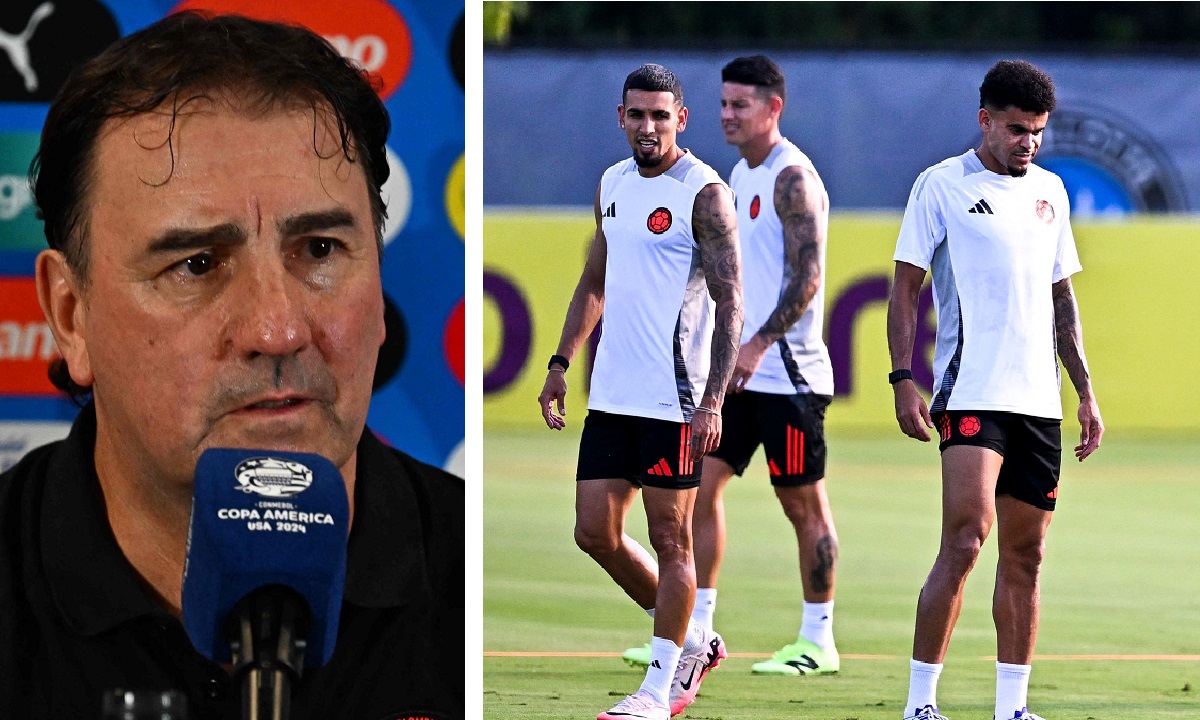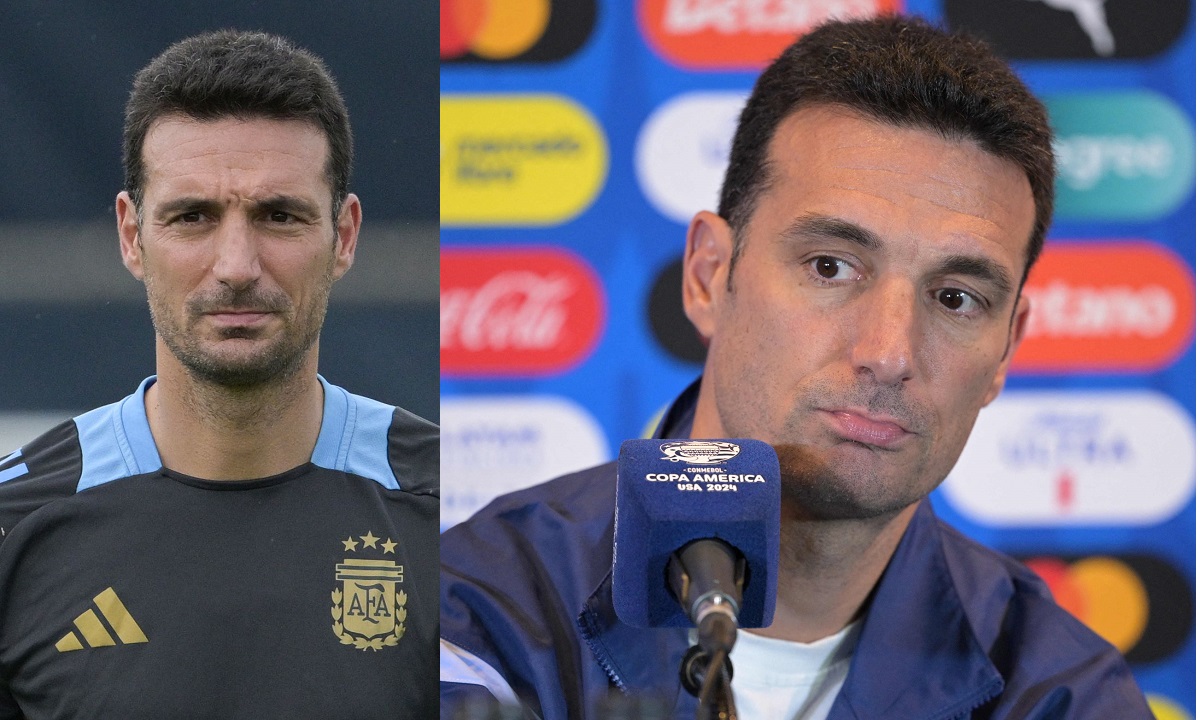If it is a matter of speculation – and the Argentines are always ready for that – tonight Néstor Lorenzo will take to the field dressed in his indispensable burgundy shirt and Lionel Scaloni will enter taking the first step with his right foot. It is not the first time that the two have met on the field, but it is the first duel in which they will face each other as technical directors. And both will want to win. Because that is what they are made of – seeking victory – since they began their lives in football.
According to the criteria of
Néstor Gabriel Lorenzo, 58, born in Villa Celina, Buenos Aires province; Lionel Sebastián Scaloni, 46, from Pujato, Santa Fe province, northeast Argentina. Both began playing as children and climbed the path, step by step, until they reached the point of wearing the national team jersey of their country – the greatest dream of every footballer – in a World Cup. Lorenzo did it in the 1990 championship; Scaloni in the 2006 one. They have had many other things in common throughout their careers. And one name, in particular, unites them: José Pekerman.
Lorenzo started playing as a child at Club Atlético Riachuelo, where his father was a faithful supporter. One tournament was enough for him to show his skills and be called up to Lanus’ youth team. Two years later he was already in the sights of talent scouts and was signed by Argentinos Juniors, which at that time had one of the best youth divisions in the country. It was managed by a man born in the province of Entre Ríos: José Pekerman.
From then on, at the age of 14 or 15, Lorenzo was observed and admired by the man who would later become a key figure in his life, not only as a footballer but also as a coach. “Lorenzo was one of the many players that Pekerman discovered,” said José Yudica, coach of Argentinos Juniors in the eighties, in an interview. “He was tall, strong, a great header.” With these characteristics, he chose defence as his place on the pitch.
After that, Lorenzo made the jump to Italian football as part of Bari, then moved to Swindon Town, in England, and received the call-up to the national team, which was then under the direction of Carlos Salvador Bilardo. He wore their shirt at the Seoul Olympics in 1988, and the 1990 World Cup. After those participations, he returned to local football in his country and was part of clubs such as San Lorenzo, Ferro and Boca Juniors, until finishing his professional career at Quilmes. He was 32 years old when he retired.
One of the fifteen matches Lorenzo played in his country’s shirt was the World Cup final in Italy, which they lost by one goal to Germany. That day he wore the number 13 on his Albiceleste shirt. The same number that, years later, Lionel Scaloni wore when he played as a right back against Mexico in the 2006 World Cup.
Pekerman Connection
Scaloni’s life as a footballer also began as a child, at Club Sportivo Matienzo, in Pujato, where he was born. He took his first steps in sport under the tutelage of his father, Ángel, who pushed him hard with the idea of making his son a great professional. It was he who managed to get Scaloni into a senior team: Newell’s Old Boys, in the mid-nineties.
From there he moved to Estudiantes de la Plata, where he quickly won the support of the fans who saw how their full-back gave his all on the pitch. It was then that the same man who had seen and chosen Lorenzo years before – Pekerman – noticed the young man who was excelling at Estudiantes. Scaloni’s good results led him to be considered for the youth squads of the Argentine national team, which in those years were under the command of the Entre Ríos coach.

Lorenzo, as Pekerman’s right-hand man, trained Scaloni before the 2006 World Cup.
Photo:
His destiny would also be to play outside his country. In 1998, Spain signed him and he joined Deportivo La Coruña. Scaloni lived there what is remembered as the “golden era” of that team: champion of the first division, the Spanish Super Cup, the Copa del Rey, among other titles, led him to be known as the ‘Superdepor’.
After eight seasons, the ‘Gringo’ – as Scaloni is known – has also been known as ‘He-Man’ behind the scenes, and left La Coruña and came to England to be part of West Ham for half a year. He also played for Racing Santander and, in the Italian league, for clubs such as Lazio and Atalanta. It was then, in the 2014-2015 season, when he decided to say goodbye to his time as a player. Lionel Scaloni already had the Under-20 World Cup in 1997 among his credentials, and having been part of the team that played for his country in the 2006 World Cup in Germany.
It was precisely during the preparation period for that World Cup that Scaloni and Lorenzo met. The former as an active footballer, the latter as an assistant to the man who was managing the national team at the time. Again, the same name: José Pekerman.
At the beginning of this century, already with coaching studies under his belt, Lorenzo was invited by Pekerman to join his team as part of the coaching staff. “I want to start coaching, but in a serious club,” Lorenzo had said. And what better proposal than the one made by his former mentor. Thus began a coach-assistant relationship that lasted for more than ten years. Until 2018, to be exact, when Pekerman stopped being the director of the Colombian National Team and Lorenzo decided to go his separate ways. For the 2006 World Cup, Lorenzo worked closely with Scaloni.
An expert in defense, he was in charge of strengthening the players who played on that field. “Néstor was one of my coaches,” Scaloni recalled a few days ago. “He is doing a great job. He has an entire country excited,” he added, regarding what Lorenzo has achieved with the Colombian group.
Both of them, as national team managers, know how to break records. And that’s even though neither of them were betting much. When Lorenzo decided to launch himself as a coach, he did not do so at a highly recognized club. He joined the Foot Ball Club Melgar, in Arequipa, Peru, where he obtained good results. He was league champion and managed to perform well in the Copa Sudamericana. However, when his name began to sound like a possible leader of the Colombian National Team, many voices jumped out to say that it was a mistake.

Lionel Scaloni, 46, coach of the Argentine national team.
Photo:
Although Lorenzo was an old acquaintance for the players, criticism was not long in coming from outside. “It’s more of the same”, “a bad start”, were some of the phrases heard when Lorenzo took control of the national team in June 2022 and made the first call-up. Today those voices – with the results obtained – have been silenced.
Scaloni experienced something similar when he took over the national team in his country. Like Lorenzo, he had also been assistant to the head coach, but his name caused uncertainty. Both critics and fans saw him as “very inexperienced”, “lacking experience”. The moment came after the disappointment left by Jorge Sampaoli. His name was first heard as something “provisional”, while other candidates with greater influence were heard as “better options for the position”. Among them, Diego Simeone or Marcelo Gallardo. Despite the doubts, Scaloni was appointed as permanent manager. He also managed to silence the barrage of reproaches with a major title: champions of the 2022 World Cup in Qatar.
Attitude: Winning
Lorenzo and Scaloni have personalities that coincide in some aspects: they are friends who keep a low profile, they rarely talk about their private lives. It is known that Lorenzo is married and has two children: a man, Juan Manuel –who accompanies him in his work– and a woman, Natalia, who, although she is a fan of this sport, works in a different field: medicine. Scaloni, on the other hand, is married to a Spanish woman, whom he met in Mallorca –where he has lived a good part of his life–, and has two children: Ian and Noah, aged 12 and 8, River Plate fans.
The two coaches also agree on sporting concepts, such as the fact that a good internal environment produces better results on the field. “You perform better if you get along well with your teammate,” said Scaloni in an interview. And it is clear that this objective has also been present in the current stage of the Colombian group.
Both of them, with their particularities, have managed to have influence over their players. Methodical, convinced of their goals, they have victory in mind. “One always plays to win,” Lorenzo has said. And that spirit permeates the team. His idea of wearing the burgundy shirt came to him after a four-month streak without losing and always wearing it. Scaloni, on the other hand, has been first on the right foot since he started in the world of football. Win or lose, he never stops doing it. Both pray. In the end: nothing is left over.
#Néstor #Lorenzo #Lionel #Scaloni #crossed #paths #Copa #América #final #Colombia #Argentina